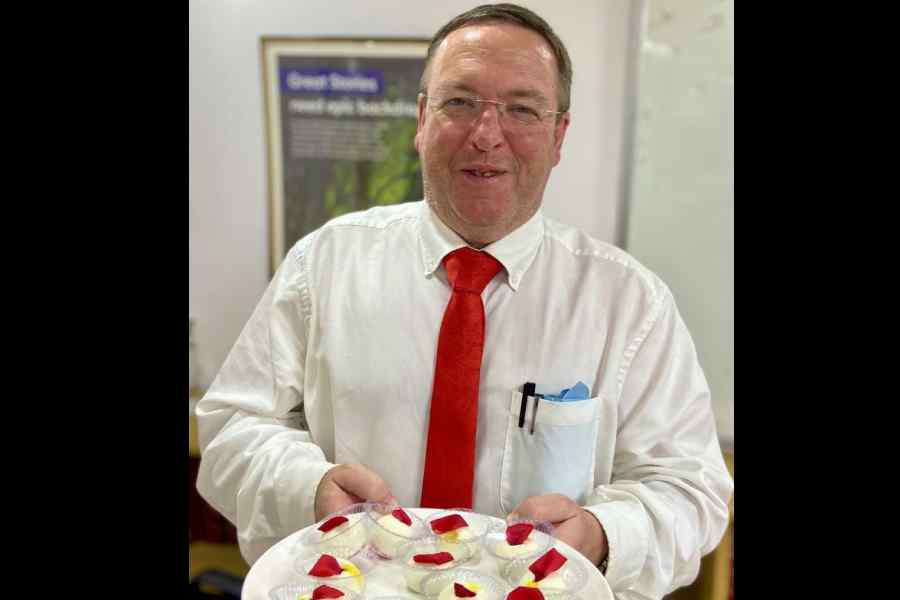New assignment
Andrew Fleming and I were having a chat at the Page Common café opposite the National Portrait Gallery. By now, he should have taken up his post as Britain’s new Deputy High Commissioner in Calcutta. He was “not just happy but delighted” that he got the job in August last year. The formal announcement has been held back until now but, in November last year, he went to Calcutta for two days to check out the scenery. He will be deputy high commissioner to 13 states in East and North-East India. “That is Chhattisgarh, Odisha, Jharkhand, Bihar, West Bengal, Sikkim and the Andamans as well. My predecessor says it’s a region twice the size of Germany, with a population larger than America... We need to see more high-profile British visitors coming to Calcutta. We are starting off with a bang with the Bengal Business Summit [with] a good showing of UK companies.”
By way of preparation, Fleming has toured the UK looking for “regional synergies” and met 50 to 60 individuals and groups from the Bengali diaspora. My wish is for Fleming to persuade UK companies to use their London experience to do two things in Calcutta — help improve the air quality and rebuild the ancient sewerage system. “Maybe I’ll write a book after I’m finished, and call it A Decade in India,” he says. “To represent the UK in such a region is an immense opportunity. I’m really proud for somebody who comes from a pretty humble background that I got the chance to do a job like this.”
Dignified ending
The historian, Zareer Masani, who lives in London and attacks detractors of the British Empire such as William Dalrymple and Shashi Tharoor, has shocked his readers by disclosing that he has made a date with a Swiss clinic, Pegasos, which “enables a person to receive a peaceful, dignified and caring assisted death.” As a historian, Zareer has argued that the Koh-i-Noor diamond should remain in Britain. I think he is getting at Dalrymple when he asserts: “Wrongly reviled by some today as evil and unscrupulous multinational raiders, the East India Company, which succeeded to unique imperial power as successor to the Mughals, was overwhelmingly preferred to its rival, indigenous warlords by most Indians who had the choice.”
In an article, “Chronicle of My Death Foretold: In defence of dignity in departure”, Masani recalled that his father, Minoo Masani, who was the leader of the ‘secular’ Swatantra Party, had founded The Society for the Right to Die with Dignity in Indian. Zareer, born a Parsi but “a dyed-in-the-wool atheist”, has wondered whether he should “soldier on” given his poor health. After smoking 40 cigarettes a day for 40 years, he has been diagnosed with chronic pulmonary disease, had a mild stroke five years ago and gets “severely breathless”. He said: “Single, childless, with no siblings or close relatives, what would be the point? My last emotional anchor was my 16-year-old dog, Susie, who died last year.” One hopes Zareer only made his appointment with Pegasos for the article. Anything else is too awful to contemplate.
Old wrongs
Yesterday’s villains become today’s heroes. When Queen Elizabeth visited Jallianwala Bagh in 1997, she stopped short of offering a full apology for the Amritsar Massacre: “It is no secret that there have been some difficult episodes in our past — Jallianwala Bagh is a distressing example. But history cannot be rewritten, however much we might sometimes wish otherwise. It has its moments of sadness, as well as gladness. We must learn from the sadness and build on the gladness.” On a state visit to Kenya this month, King Charles III also expressed regret without saying sorry for the British human rights abuses: “The wrongdoings of the past are a cause of the greatest sorrow and the deepest regret. There were abhorrent and unjustifiable acts of violence committed against Kenyans as they waged [...] a painful struggle for independence and sovereignty — and for that, there can be no excuse.”
Let there be light
To borrow and amend a saying usually reserved for cricket, Diwali is a British festival accidentally discovered by the Indians. Parts of the UK are lit up for the occasion and, instead of pandal hopping, one can go from one Diwali party to the next. The only Parsi peer in the Lords, Karan Bilimoria, who recently visited the Israel-Gaza border, said at a Diwali party hosted by Grant Thornton: “This is a precarious and dangerous time. And there is no better time for us to be celebrating Diwali, the celebration of light over darkness and of good being a victor over evil. And what happened a month ago
was sheer evil. So let’s hope the spirit of Diwali helps us going forward.”










